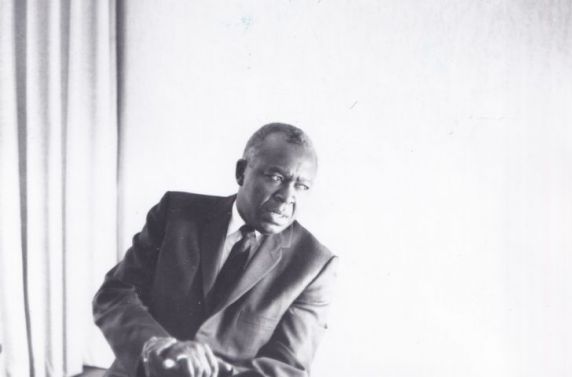Horace Sheffield Jr. Papers Now Open
The Walter P. Reuther Library is pleased to announce an addition to the Horace Sheffield Jr. Papers is now open for research. These materials were previously under the stewardship of the Charles H. Wright Museum and join a small existing collection of Sheffield’s at the Reuther. Sheffield was a prominent voice in Detroit’s labor and civil rights movements, and his collection is an exciting example of the overlapping movements in Detroit.
Sheffield arrived in Detroit as a child via the Great Migration when his family, "convinced that the opportunities for Blacks to improve their life chances in the South were non-existent," relocated from Georgia. His father went to work in the Ford iron foundry, and as a founder of the Tabernacle Baptist Church of Detroit and proponent of the local block club movement, the elder Sheffield established a tradition of the family as engaged members of Detroit’s Black community that continues today.
In 1934, Sheffield joined his father in the iron foundry (UAW Foundry and Forge Department Records) at the Dearborn River Rouge Plant, a particularly grueling post often reserved for Black workers. He joined the UAW in 1940 and was instrumental in staging the landmark River Rouge Plant strike in 1941, during which he used a borrowed sound truck to appeal to Black strikebreakers, pressing them to leave the plant. Over the next four decades, he held a variety of elected and appointed roles with the UAW. As President of Local 600 (UAW Local 600 Records), he represented Ford’s largest unit of black workers; he served as Education Director of the Dearborn Iron Foundry Unit of Local 600; was appointed to the UAW Defense Employment Department of the International Union; and helped establish the UAW’s Inter-Racial Committee (UAW Civil Rights Department Records).
He served as Administrative Assistant to Vice President Nelson Jack Edwards and Presidents Leonard Woodcock and Douglas Fraser until his retirement in 1981. Sheffield spent his long career with the UAW dedicated to improving Black opportunity and representation in the trades and union leadership alike.
Particularly when it came to voting rights and electing supportive leaders to public office, Sheffield also committed himself to the larger civil rights movement. He sat on A. Philip Randolph’s March on Washington Committee, resulting in the establishment of the Fair Employment Practices Committee in 1941; organized voter registration campaigns in the South for more than ten years in the 1950s and 1960s; and marched in watershed demonstrations including Detroit’s Freedom March in 1963 and the Selma March in 1965.
Sheffield’s accomplishments and service to labor, civil rights, and Detroit are too many to count. They include serving as Vice President of the Negro American Labor Council (NALC); Director of the Detroit National Association for the Advancement of Colored People (NAACP) (NAACP Detroit Branch Records; NAACP Detroit Branch Photographs); President and Co-Founder of the Detroit Coalition of Black Trade Unionists (CBTU) (Coalition of Black Trade Unionists Records; Coalition of Black Trade Unionists Oral Histories); Co-founder of the Trade Union Leadership Council (TULC); and Co-Founder of the Detroit Association of Black Organizations (DABO). He worked alongside giants such as Martin Luther King Jr., Bayard Rustin, Robert "Buddy" Battle III (Robert “Buddy” Battle III and Marion Battle Papers), and Walter Reuther (UAW President’s Office: Walter P. Reuther Records).
Sheffield passed away in Detroit in 1995. The Sheffield name remains prominent in Detroit, with third and fourth generation family members active in the city’s public schools, government, and religious community.
Other related collections include Black Workers in the Labor Movement Oral Histories, UAW Fair Practices and Anti-Discrimination Department Records, and his long-running newspaper columns can be accessed in the Michigan Chronicle and Detroit News databases.


 Reddit
Reddit Facebook
Facebook LinkedIn
LinkedIn